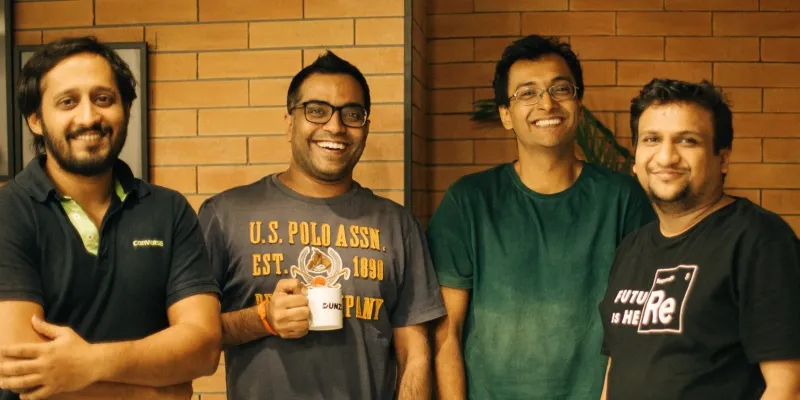How Dunzo is meeting the 3x surge in demand for essentials despite a broken supply chain
From remote on-boarding of merchants to tie-ups with brands for distribution hubs, Bengaluru-based hyperlocal delivery startup Dunzo is going the extra mile to ensure that customer demand is fulfilled despite the frozen supply chain.
India has been under lockdown for 27 days now to avert the spread of coronavirus. Unable to step out, people in cities have been placing more and more orders online. E-grocers, meanwhile, are struggling to meet the soaring demand.
The extended confinement has truly tested the elasticity of the hyperlocal delivery supply chain.
However, Bengaluru-based hyperlocal delivery startup is working to ensure that it doesn’t do just business as usual, but thrives.
Kabeer Biswas, CEO and Co-Founder, Dunzo, says: “Across the country, there is a demand for essentials due to the lockdown. In these extraordinary times, companies need to rise to the occasion.”
The Google-backed startup’s average order value (AOV) has seen a 4x increase. The primary growth rate in perishable goods and food and beverages has seen a 3x growth, and essential goods share of orders on the platform has doubled.

Founders of Dunzo- Kabeer, Mukund, Ankur, and Dalvir
Working amid changing regulations
When the lockdown was first announced, regulations of what fell under the essentials category varied for different states.
For example, in Tamil Nadu, grocery delivery was considered an essential, but food delivery wasn’t. And now Telangana has done the same. Regulations also changed, depending on locations and local authorities on ground.
Weeks later, there is clarity on what constitutes essentials and who can ensure movement of goods. However, there are still a few hotspots in Mumbai and Pune, where several localities have been shut.
But the Dunzo team says the government has worked fast to provide digital COVID-19 passes and aligned with factories and startups to get things going.
Dunzo, however, works differently as compared to regular e-grocers. It isn’t a regular two-sided marketplace; it encompasses three aspects: partner, source, and delivery.
In the current scenario, it is important that each of the sides is “dynamic and adaptable to the fluid changes in policy and strategy”.
On the partner side
Kartik Mishra, Head of Strategy and New Initiatives, says, “When the lockdown was first announced, it took us the first few days to get into the flow and work with authorities to ensure smooth operations. But, we have been able to get our systems going and ramp up ops.”
Catering to the increase in demand necessitated a snowballing need for delivery partners. After the passes were in place, along with assurances from local authorities, Dunzo was able to provide vital safety measures like tests, masks, and gloves, and mobilise the delivery staff.
The startup then began remote on-boarding to bring in more partners and ensure they followed social distancing.
Kartik says, “Partners working with other platforms, which don’t have much demand, are now are looking at Dunzo. Earlier, they would walk into the office with their documents, and learn the workings on the go. Now, they send all their documents online, and we send them a digital version of how the partner app functions. This has led to an influx of new partners.”

Dunzo Partner
To ensure that the quality of service remains consistent, the team is ensuring that partners who are on-boarded digitally are not assigned complicated tasks.
“We make them do X number of easy tasks before they take a complex task,” Karthik adds.
He explains that all platforms have a different mix of people. Many have a high proportion of part-time workers, who do delivery jobs for few hours. “For people who used to do deliveries for two hours, there isn’t incentive enough to come out during the coronavirus situation,” Kartik says.
At Dunzo, however, most delivery partners clocked in six to eight hours.
“What is happening now is that while consumers do walk into stores to pick up a few items, they also look at online delivery platforms for safety reasons. When they come to Dunzo, instead of looking at one or two categories as they would earlier, they now consider more.”
This has driven the AOV up 4x.
Anirban Das, Head of Product, Dunzo, says: “As we see a rise in demand for essentials, we are powering the tech to enable higher transaction volumes while maintaining the speed and efficiency of our promised delivery timelines.”

Kartik Mishra
Keeping delivery partners safe
While remote on-boarding is helping bring in more delivery partners, Dunzo is keen to ensure their safety.
“Dunzo is keeping people indoors and helping them stay safe. Our delivery partners are braving the streets to ensure people have access to daily essentials, from groceries to medicines. As they do, we are constantly improving and abiding by prescribed health measures and ensuring that the safety and security of delivery partners and their families are taken care of,” Kabeer says.
The team constantly reiterates to partners the importance of adhering to social distancing norms. For this, it has limited the number of partners that can go to a store. Redundant activities and multiple tasks end up using too much of a partner’s bandwidth – something the team wants to avoid.
The hyperlocal delivery startup is for now focusing only on grocery and medicines; orders for all non-essentials have been stopped.
Also, users cannot order more than 10 items on the platform. Earlier, the app would display the closest store, but because of COVID-19, the closest store may not have availability. So, now the user can see the best store nearest to them, which carries the products s/he wants.
The platform also displays the last orders. For example, if someone has placed an order from an MK Retail store 10 minutes earlier, the next user will be aware that the store may have stock.
“We have started a crowd-sourced fund for our partners. Dunzo’s leadership team has contributed 50 to 100 percent of their salaries, and we have fulfilled 10 percent of our target with employee salaries. We are hoping to bring in more revenue to our 30,000 partners,” Kartik says.

The leadership team at Dunzo
The issue of delivery timelines
But while the demand has been high one of the reasons why the deliveries have been a problem is because the entire supply chain is frozen. If people haven’t been able to go to factories for production, and logistics isn’t allowed to move that freely, the products do not reach the stores.
Kartik says the fact that people are buying essentials in bulk is adding to the problem. “Especially products like milk, bread, and eggs, there is a lot of hoarding that people end up doing,” he says.
The increase in store walk-in volumes and the fact that they are no longer open all day is compounding the problem. “Now, at the store, the walk-in customer ends up getting more priority, so invariably the delivery partner may have to wait longer than what he had to earlier,” Kartik adds.
Most employees have gone back to their hometowns or villages, meaning stores don’t have the bandwidth to even cater to standalone walk-ins let alone the surge in demand.
Working with the supply
The issues of stock-outs, high walk-ins, and low bandwidth continue. But Dunzo has been able to work hacks around that: talking to the store in advance and ensuring products are ready for pickup before the partner reaches.
“Wherever there are stores with low manpower, we have helped them. They can serve both offline and online orders. This has possibly increased merchant trust in us,” Kartik says.
Dunzo has helped its top stores tie up with multiple suppliers and brands to ensure a larger supplier base and increased options.
The startup has also collaborated with brands such as Britannia and Safola directly; it has listed the brands’ distribution hubs as stores on the platform.
One of the bottlenecks many brands face is ensuring that goods go from their warehouses and distribution hubs to stores. Many brands are even providing the Dunzo team with logistical help to move products from distribution hubs to the retailers.
“Whether it's the product or the service, our aim is to mitigate health risks and panic due to this outbreak. As a product, agility has been key as we have left no stone unturned in terms of ensuring safety for our users, merchants, and delivery partners. We are facilitating safer offline interactions through no contact delivery , and aiding the government in its efforts to contain the virus,” Anirban says.
Most FMCG brands tend to have 15 to 20 distribution hubs within the city. Whenever the team works with the brand, they figure out the five to seven best located distribution centres and on-board them. Citing an example, Kartik says if they onboard a distribution hub in MG road, Bengaluru, it can cater to most of the neighbouring areas across.

Anirban Das, Dunzo
Does a smaller radius help?
However, one important point to note is that Dunzo is not operational in all areas like Swiggy, Zomato, or BigBasket. Does the smaller radius also help in deliveries?
Kartik feels that doesn’t affect Dunzo much as the core premise of the platform has always been that it can deliver anything from anywhere.
“We are seeing a surge of demand and downloads from areas where we haven’t been functioning. Internally, we are thinking of opening up newer areas. But when you open the area, you need to have merchants on the platform for a good experience. If the user sees the closest store is 9 km away it isn’t a great experience,” he says.
This is why Dunzo is increasing its focus on getting more distribution hubs of the brands. “This may give the users better guarantee. We are also working with the merchants for better manpower support.”
(Edited by Teja Lele Desai)



![[Product roadmap] Starting out on WhatsApp, how Dunzo became India’s go-to hyperlocal delivery startup](https://images.yourstory.com/cs/2/a9efa9c02dd911e9adc52d913c55075e/Dunzoproduct-road-map-1581520789482.png?fm=png&auto=format&h=100&w=100&crop=entropy&fit=crop)
![[The Turning Point] From starting as a WhatsApp service to getting Google to make its first direct investment in India - the Dunzo journey](https://images.yourstory.com/cs/wordpress/2018/12/Dunzo-Leadership1.jpg?fm=png&auto=format&h=100&w=100&crop=entropy&fit=crop)






